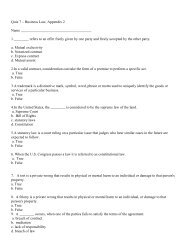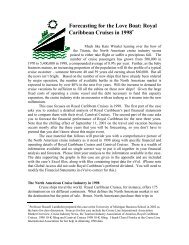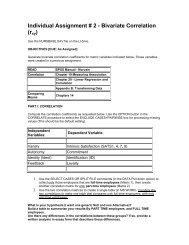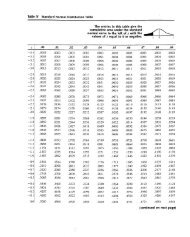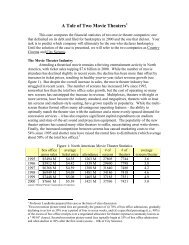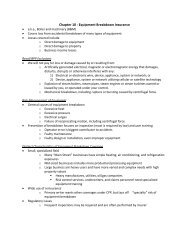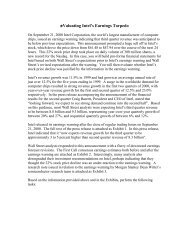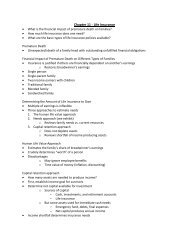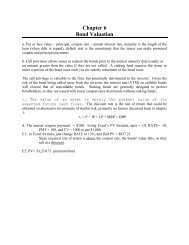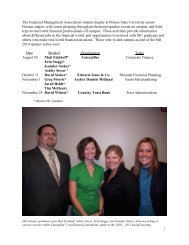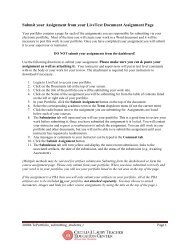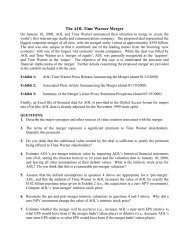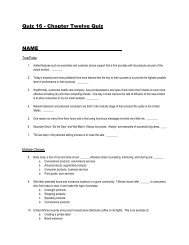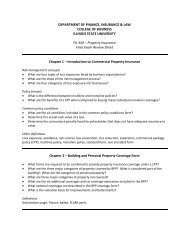MQM 421 Organizational Behavior - Illinois State University
MQM 421 Organizational Behavior - Illinois State University
MQM 421 Organizational Behavior - Illinois State University
You also want an ePaper? Increase the reach of your titles
YUMPU automatically turns print PDFs into web optimized ePapers that Google loves.
Spring 2012 <strong>Illinois</strong> <strong>State</strong> <strong>University</strong><br />
COURSE:<br />
PREREQUISITE:<br />
RESOURCES:<br />
INSTRUCTOR:<br />
<strong>MQM</strong> <strong>421</strong> <strong>Organizational</strong> <strong>Behavior</strong><br />
<strong>MQM</strong> 402; Student must have met the<br />
prerequisites to remain in the class.<br />
1.) Jerald Greenberg, <strong>Behavior</strong> in<br />
Organizations, 5th ed., Mason, OH:<br />
Thomson, 2010. ISBN-10: 0131992384<br />
2.) C. Neck and C. Manz. Mastering Self-<br />
Leadership, Upper Saddle River, NJ.<br />
Prentice-Hall, 2010. ISBN-10: 0136066453<br />
3.) Articles, PPT’s, and Handouts are stored on<br />
the COB u:drive.<br />
4.) Cases, available for purchase at Harvard<br />
Business School<br />
Dr. Michael P. Dumler<br />
TIME AND LOCATION: M: 6:00 - 8:50; SFHB 133<br />
OFFICE HOURS:<br />
OFFICE/PHONE:<br />
E-MAIL<br />
By Appointment<br />
SFHB 210; 438-8564 (Leave MSG on Voice-<br />
Mail)<br />
mpdumler@ilstu.edu<br />
COURSE DESCRIPTION:<br />
The course provides a broad exposure to many topics in the field of organizational behavior.<br />
<strong>Organizational</strong> behavior focuses on understanding individual, and group behavior in applied<br />
organizational contexts. Common topics in the study of organizational behavior include learning,<br />
perception, conflict, power, leadership, motivation, and organizational change. One goal of the<br />
course is to review current theories of individual and group behavior and apply theoretic<br />
explanations for common situations that managers often experience. Articles, cases, and group<br />
discussion are used to achieve this goal. Students are expected to voluntarily participate in each<br />
the aforementioned activities.<br />
COURSE OBJECTIVES:<br />
1. Identify explanatory factors that contribute to understanding human<br />
behavior in organizations.<br />
2. Use and evaluate assessment tools for understanding individual<br />
differences.<br />
3. Understanding individual and group behavior at work through the use of<br />
articles, cases, experiential exercises, and topic research.<br />
4. Develop critical thinking skills applied to understanding our own attitudes<br />
and behavior at work and those of other members of the organization.
<strong>MQM</strong> <strong>421</strong> <strong>Organizational</strong> <strong>Behavior</strong> Spring<br />
2012<br />
5. Enhance leadership skills and written and oral communication skills. The<br />
student will present the results of management research to the class, as<br />
well as, write a graduate-level paper in an area of organization behavior.<br />
RESEARCH PAPER [DUE: 4-16]<br />
A graduate-level paper is a course requirement. The paper should review current research or<br />
writing about a particular issue or topic (e.g., Emotional Intelligence, Emotional Labor, Goal<br />
Setting, Self-leadership, <strong>Organizational</strong> Culture, Burnout, Leader-Member Exchange, Fairness<br />
and Justice at Work, Impression Management, etc.). Pick a topic that you have interest in or<br />
examine the topic in a specific context (e.g., health care, sports, insurance). In any event, the<br />
topic chosen should have a solid theoretical foundation and demonstrate the theory's practical<br />
utility to managers. Remember, this is not an exercise in theory but rather a source of<br />
information that should be useful to managers.<br />
I<br />
RESEARCH PAPER (10 pgs. minimum). The purpose of this type of paper should be to review<br />
a topic discussed in the literature. The focus of the paper should be on new or recent research<br />
findings over the past 10 years. It is best to pick a well-defined topic or body of literature (e.g.,<br />
<strong>Organizational</strong> Citizenship <strong>Behavior</strong>) and write your paper on that topic. By Week 5 (2/20) each<br />
student doing a issue/topic review should submit: (1) an annotated (one paragraph annotation<br />
per article) bibliography (i.e., complete citation in APA style) that lists about 15 articles for the<br />
topic review paper, and (2) include a table that organizes the articles on some basis<br />
appropriate to the topic under investigation. Your classification schema should serve to group<br />
articles into workable sub-topics. This simply means that you organize your articles in a table<br />
with the articles as rows and columns that separate or classify your articles in some manner<br />
(e.g., classify as empirical or conceptual).<br />
TEAM WORK<br />
The class will be divided into five teams (e.g., teams will be designated T1, T2; “shadow teams”<br />
designated as S1, S2).<br />
Presenting Team (T) is responsible for delivering class content for two class sessions. This<br />
task includes presenting an article and/or case, leading article/case discussion, and creating<br />
and transmitting to the instructor a PowerPoint presentation of the article or article/case and a<br />
written analysis of the case (during the second rotation, you only need a written analysis for the<br />
case. However, you may still choose to use PPT in your presentation). A written case analysis<br />
should include: (1.) an introduction to the general situation or problem, (2.) a review of case<br />
facts that clarify the specific issue(s) (this includes any analysis), (3.) at least two alternatives,<br />
and (3.) a recommendation for action. For all written assignments, please include a cover page<br />
with team number, members names, assignment name, date (Please number every page,<br />
except the cover page).<br />
Shadow Team (S) is responsible for questioning the presenting group and critiquing the group<br />
presentation. The shadow team submits a one page critique of the case (Due at the time of the<br />
presentation) indicating major issues, and recommendations to resolve issues or problems.<br />
Other Teams should read the case and offer any ideas of suggestions during discussion.<br />
2<br />
<strong>Illinois</strong> <strong>State</strong> <strong>University</strong>
<strong>MQM</strong> <strong>421</strong> <strong>Organizational</strong> <strong>Behavior</strong> Spring<br />
2012<br />
This will be a time when the instructor expects voluntary participation from group members and<br />
records your participation quantity and quality. Successful team work requires planning,<br />
coordinating, leadership, and motivation -- to name a few managerial skills. Remember that<br />
while two teams are responsible for the nightly topic and case, all class members should<br />
read all required material and be prepared to voluntarily contribute to the general<br />
discussion. All articles are on the u:drive and cases can be purchased at:<br />
http://cb.hbsp.harvard.edu/cb/access/12329004<br />
ATTENDANCE AND PARTICIPATION<br />
Attendance is mandatory for active involvement in the class.<br />
Participation means:<br />
Reading all Material prior to class.<br />
Being prepared to get involved in class discussion.<br />
Taking notes or record ideas for future reference.<br />
Be a good Team member - help your team succeed.<br />
Trusting your experience and judgment -- it got you this far.<br />
Helping create the social environment and not react to it.<br />
EVALUATION PROCEDURE<br />
EXAM # 1 25% 100<br />
EXAM # 2 25% 100<br />
PAPER 25% 100<br />
Participation 10% 40<br />
Cases 15% 60<br />
TOTAL<br />
100% 400pts<br />
3<br />
<strong>Illinois</strong> <strong>State</strong> <strong>University</strong>
<strong>MQM</strong> <strong>421</strong> <strong>Organizational</strong> <strong>Behavior</strong> Spring<br />
2012<br />
All Articles and Handouts are available on the COB u:drive.<br />
Neck Article/Exercise<br />
Session<br />
Greenberg and<br />
Content<br />
Manz<br />
1 1-23<br />
Class organization<br />
and responsibilities<br />
2 1-30<br />
Introduction to<br />
<strong>Organizational</strong><br />
<strong>Behavior</strong><br />
Chapter 1,2<br />
#0 Drucker, P. (2005). Managing<br />
Oneself. Harvard Business Review, 83<br />
(1).<br />
#00 Livingston, J. S. (2003). Pygmalion<br />
in management (HBR Classic). Harvard<br />
Business Review, 81(1), 97-106<br />
3 2-6<br />
T1<br />
Perception and<br />
Personality<br />
Changing<br />
Employee <strong>Behavior</strong><br />
Chapter 3 1-2<br />
#1 Rousseau, D. M. (2004).<br />
Psychological contracts in the workplace:<br />
Understanding the ties that motivate.<br />
Academy of Management Executive,<br />
18(1), 120-127.<br />
#2 Levinson, Harry. Abrasive Personality.<br />
Harvard Business Review. (Nov. Dec.),<br />
1999 (also 1967).<br />
T1 Discussion of Chapters 1-2 (N&M)<br />
Self-Assessment/Exercise Greenberg<br />
(Self-Efficacy exercise, p 97)<br />
4 2-13<br />
T2 Motivation Chapter 6 #3 McClelland and Burnham. (1995, also<br />
1976). Power is a Great Motivator.<br />
Harvard Business Review, (Jan-Feb).<br />
#4 Kerr, s. (1995). On the Folly of<br />
Rewarding A While Hoping for B.<br />
Academy of Management Executive,<br />
9(1), 7-14.<br />
Self-Assessment/Exercise Greenberg<br />
(What Rewards do you value?, p. 188)<br />
5 2-20 T3 Decision Making Chapter 10<br />
#5 Pfeffer, J., & Sutton, R. I. (2006).<br />
Evidence-based management. Harvard<br />
Business Review<br />
4<br />
<strong>Illinois</strong> <strong>State</strong> <strong>University</strong>
<strong>MQM</strong> <strong>421</strong> <strong>Organizational</strong> <strong>Behavior</strong> Spring<br />
2012<br />
#6 Garvin, David and M. Roberto. (2001)<br />
What you don't know about making<br />
decisions. Harvard Business Review,<br />
September, 108-116.<br />
Self-Assessment/Exercise Greenberg<br />
(Are you risk seeking or risk averse?, p.<br />
307)<br />
#7 Ferris et al. (2000) Political Skills at<br />
work. <strong>Organizational</strong> Dynamics, 26, 25-<br />
37.<br />
#8 Perrewe et al. (2000) Political Skill: an<br />
antidote for workplace stressors.<br />
6 2-27 Power and Political<br />
Academy of Management Executive, 14,<br />
<strong>Behavior</strong><br />
115-123.<br />
Self-Assessment/Exercise Greenberg<br />
T4<br />
(T4 will need to find an appropriate<br />
assessment for power)<br />
7 3-5 Exam1<br />
8 3-12 Spring Break<br />
Chapter 11 3 #9 Goffee and Jones. (2000). Why<br />
should anyone want to be lead by you?<br />
Harvard Business Review, Sep-Oct.<br />
T5<br />
9 3-19 Leadership<br />
#10 Zalesnik, A. (1992, also 1977).<br />
Managers and Leaders: Are they<br />
different? Harvard Business Review.<br />
Mar-Apr.<br />
Discussion of Chapter 3 (N&M)<br />
T5 SLQ1, p. 16 or Self-<br />
Assessment/Exercise<br />
Greenberg,(Determining your leadership<br />
style, p. 337)<br />
10 3-26<br />
#11 Bill George, et al. (2007) Discovering<br />
your Authentic Leadership, Harvard<br />
Chapter 11 4 Case #1 A Day in the life of Alex Sanders<br />
T1<br />
Business Review, 2, 1-8.
<strong>MQM</strong> <strong>421</strong> <strong>Organizational</strong> <strong>Behavior</strong> Spring<br />
2012<br />
Discussion of Chapter 4 (N&M)<br />
T2<br />
5-6 Case #2 Engstrom Auto Mirror Plant<br />
S4<br />
11 4-2<br />
#12 Schrank, Robert (1994). Two<br />
Groups, Teams and<br />
Chapter 9<br />
Women, Three Men on a Raft. Harvard<br />
Teamwork<br />
Business Review, (May-June).<br />
Discussion of Chapters 5-6 (N&M)<br />
7-8 Case #3 Thomas Green: Power, Office<br />
Politics, and A Career in Crisis.<br />
12 4-9<br />
Managing Conflict,<br />
#13 Amason, A., Hochwarter, W.,<br />
Burnout and Stress<br />
Thompson K., and Harrison, A. (1995).<br />
[Research Paper<br />
Conflict: An Important Dimension in<br />
Due]<br />
Successful Management Team.”<br />
<strong>Organizational</strong> Dynamics, 24(2), 20-35.<br />
T3<br />
S2<br />
Discussion of Chapters 7-8 (N&M)<br />
Chapter 8<br />
Chapter 12<br />
9-10 Case #4 Stone Finch, Inc<br />
13 4-16<br />
Communication<br />
<strong>Organizational</strong><br />
#14 Tannen, D. (1995). The power of talk:<br />
Who gets heard and why? Harvard<br />
Culture<br />
Business Review, 73 (5), 138-148.<br />
T4<br />
S3<br />
Discussion of Chapters 9-10 (N&M)<br />
Chapter 14 11-12 Case #5 Campbell and Bailyn’s Office<br />
14 4-23<br />
<strong>Organizational</strong><br />
#15 Kotter, J. P. (1995). Leading change:<br />
Change<br />
Why transformation efforts fail. Harvard<br />
<strong>Organizational</strong><br />
Business<br />
Change<br />
Review, 73(2), 59-67.<br />
T5<br />
S1<br />
Discussion of Chapters 11-12 (N&M)<br />
15 4-30 EXAM 2<br />
16 5-7<br />
Return Papers and<br />
Final exam Grades



